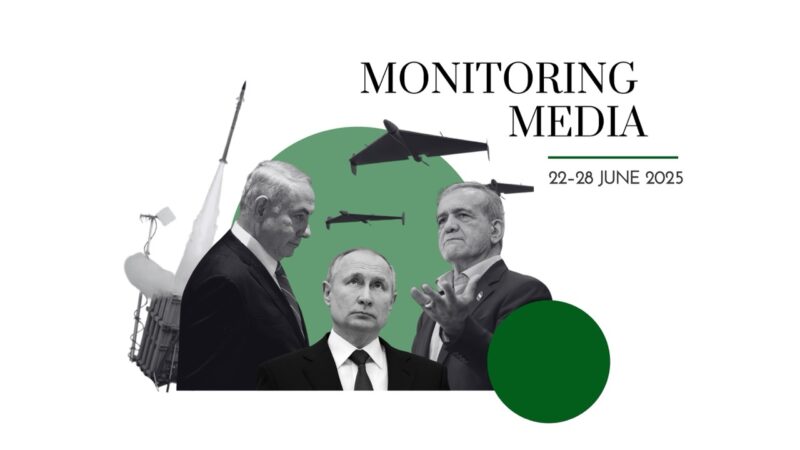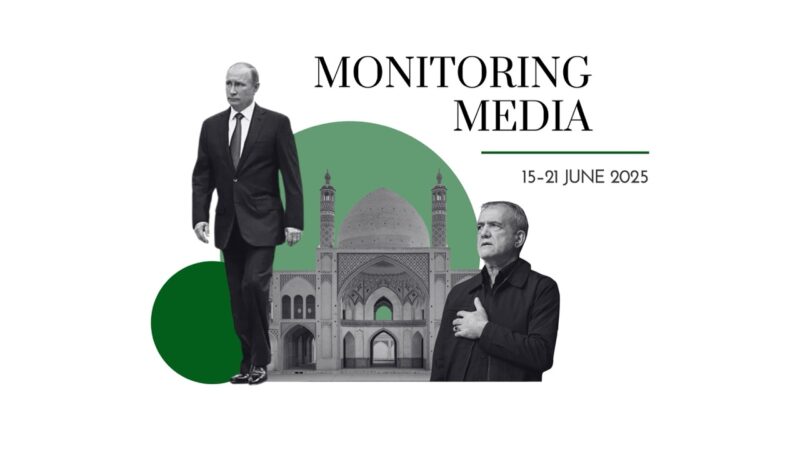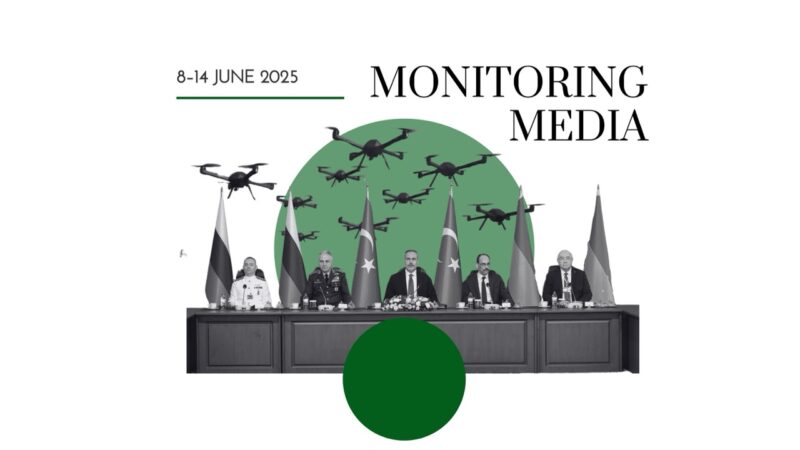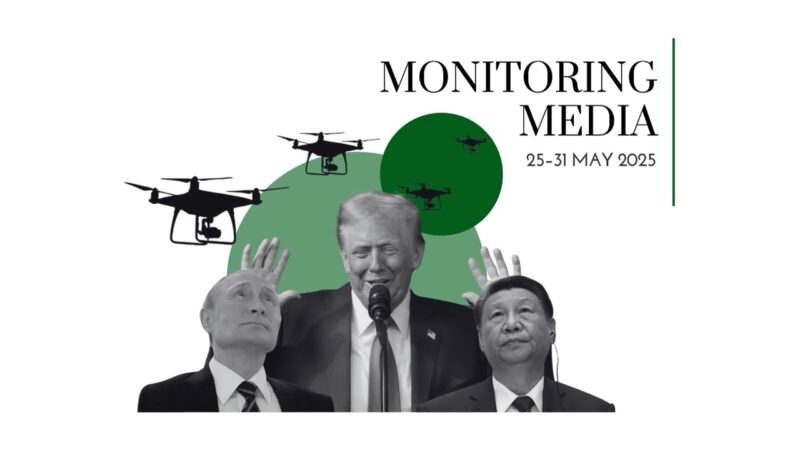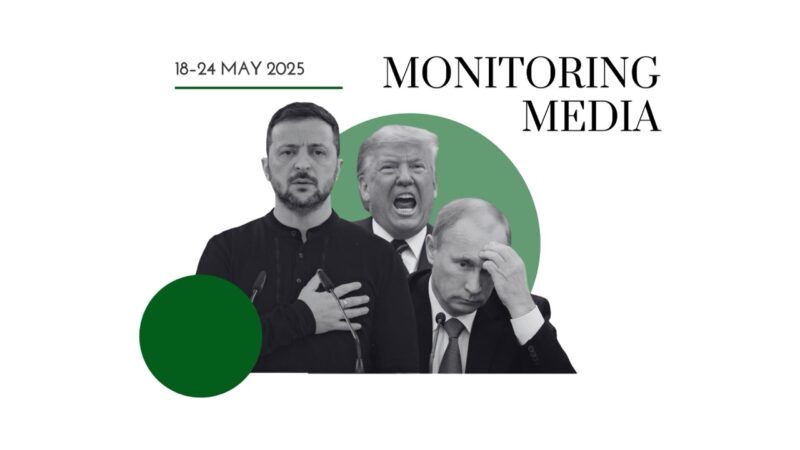Russo-Ukrainian war prompts the West to manufacture more weapons

CIUS weekly report on North American media coverage of Ukrainian affairs, 11–17 March 2023
Three publications (The Economist, Foreign Affairs, and Foreign Policy) were selected to prepare this report on how the situation in Ukraine was portrayed in the North American press during the past week (11–17 March 2023). The sample was compiled based on their impact on public opinion as well as on their professional reputation, popularity among the readership, and topical relevance. These three publications represent centrist and conservative viewpoints on the political spectrum.
This report covers only the most-read and relevant articles about Ukraine, as ranked by the respective North American publications themselves in the past week. Its scope covers promoted articles on home pages and articles from special sections on Ukraine, with the hashtag #Ukraine, from the paper editions of the publications, and about Ukraine from opinion columns and editorials.
Topics featured in the selected articles:
- Ukraine’s current affairs: Ukraine’s energy grid resilient to Russia’s air attacks; Ukrainian army successes derive from fundamental and drastic military reforms;
- The world and Ukraine: the West should build in flexibility to personal sanctions against Russians; Western hesitancy in arming Ukraine only prolongs the conflict; Ukraine’s victory remains in the US national interest; US should strengthen its defence industry;
- Russia at war: the few countries supporting Russia internationally are not cohesive; Russians’ attitude toward crimes in Ukraine is imperial and socially immature; Russia uses grain export deal as leverage to get more concessions from the West.
Main arguments:
Ukrainians have learned to maintain a functional energy infrastructure despite Russian bombardments. The Economist highlights that unlike in the first days when Russian drones and missiles targeted Ukraine’s energy infrastructure, after half a year of bombardments there is no more panic: “Ukraine is still winning a battle in which few had expected it to prevail. Engineers are now repairing the system faster than it can be destroyed. Before the latest attack, Kyiv had enjoyed four consecutive weeks with no outages.” Ukraine’s energy resilience was built by “preparation, luck, quick thinking, and new air-defence systems.” That being said, more than 100 energy workers lost their lives during missile strikes or damage repairs. During this winter a critical situation emerged several times in Kyiv’s gas and water supply, as well as with central heating and sewerage systems. The lack of electricity meant that other utilities could not be provided in full. The war against Ukraine’s energy infrastructure still continues, as Russia tries to pinpoint Ukraine’s air-defence systems so that their missiles and drones are not intercepted; meanwhile, the Ukrainians do their best to fake launch positions and regularly relocate their defensive arms. The Economist writes that Ukraine’s effectiveness in intercepting Russian air attacks increased significantly (to 75 per cent) when NASAMS and other equipment was delivered from the West, as well as when new mobile anti-drone units were deployed. In turn, Ukraine’s energy workers learned to do “impossible repairs” and are planning to move the most vulnerable parts of the grid underground. The Economist concludes that Ukrainians “made the impossible ordinary.”
Ukraine’s motivated leadership lies behind the success of US military aid to the country. Polina Beliakova and Rachel Tecott Metz (Foreign Affairs) open their article with an observation that while the US provides security assistance to many countries with mixed results, its aid to Ukraine has exceeded all expectations. In its defence against Russia, the Ukrainian army has demonstrated very high effectiveness and professionalism in utilizing American-supplied equipment and ammunition, as well as applying their training and advice. Beliakova and Tecott Metz suggest that “one of the main reasons security assistance has succeeded [unlike in the cases of Afghanistan or Iraq] has to do with the motivation of Ukraine’s leadership. If leaders are not prepared to prioritize institutional reforms that will strengthen their militaries, then foreign support will be of little consequence.” While continuously reforming the Armed Forces of Ukraine after the annexation of Crimea, the government in Kyiv still avoided eradicating the embedded parochial structures and inflexible system of subordination that were typical in post-Soviet countries. However, with the 2022 Russian invasion, when survival of the country was at stake, military necessity overcame political inertia and a series of complex reforms was introduced: “Kyiv focused on a single priority: maximizing the effectiveness of its forces fighting against Russia. Doing so required both reforming the defense institutions and increasing security cooperation with the West.” In addition, the government in Kyiv initiated inspections and investigations to tackle corruption in defence procurement; developed new legal foundations and institutional capacity for mobilizing, training, and deploying its reserve corps; and facilitated cooperation with grassroots initiatives to address immediate army needs (e.g., purchase of communication devices, laptops, generators, telescopic sights, and advanced drones for combat and reconnaissance).
The West should revise the system of personal sanctions imposed on Russians. Leonid Volkov, chief of staff to Russian opposition leader Alexei Navalny, argues in The Economist that the West’s system of personal sanctions against Russians needs to be reconsidered, as it pushes political heavyweights who might be potential challengers to Putin to actually support the Kremlin. Since the outbreak of the war, over 1,400 people have been put on the sanctions lists. Recently, the EU adopted a tenth package of sanctions, which will likely not achieve its expected objectives (neither did all the previous ones): it will neither make “any significant effect on Mr. Putin’s ability to continue his criminal war” nor trigger “a split within the Russian elite or trigger defections.” If a person’s name appears on the sanctions list, it is a one-way ticket; condemned by Western governments, such a person has “no option but to stay on board Mr. Putin’s boat, even if it is sinking.” Volkov suggests that a new system of sanctions should make the list of penalized people longer but also offer nonconformists a way out—for example, to “include a public breaking of ties with, and condemnation of, Mr. Putin’s regime and the transfer of a sizable portion of their wealth to Ukraine as compensation.” Incidentally, if offered a way out, then the penalized citizens of Russia would presumably file fewer court appeals. Volkov concludes that the people on the sanctions lists have no incentive to criticize Putin and the war today: “All you would get in return for doing so is trouble in Russia. You would gain nothing from the West.”
Limiting Western supplies of weapons to Ukraine prolongs the war and stimulates Russia’s appetites. Sam Greene and Alina Polyakova (Foreign Affairs) open their article with an assertion that the Russo-Ukrainian war may last for years: “Even as the United States and its allies have sent billions of dollars’ worth of military equipment to Ukraine, there remains one thing they seem unable to supply: a clear, united commitment to a rapid Ukrainian victory.” Apart from prolonging the war, this lack of commitment leads to undesirable outcomes for Ukraine and the West. Most importantly, refusing to provide weapons to Ukraine upon request, only providing them after months of debate, demonstrates to everyone but particularly to Russia and its allies that Western governments are undecided and unreliable. Secondly, the West’s lack of full and unreserved commitment to Ukraine’s victory “is encouraging Putin to believe that time is on his side and that the United States will eventually tire, as it did in Afghanistan.” Thirdly, the slow response from NATO, the EU, and the UN prompts Russia to continue undermining the international order; unchecked, it will instigate “an era of permanent border wars, regional conflict, arms races, refugee crises, and disrupted trade.” Fourthly, any reduction in Western support for Ukraine will likely lead Moscow to increase its firepower and magnify its war objectives. Greene and Polyakova conclude that “allies should lay in the logistics for supply and maintenance [of full weapons support to Ukraine] now, and deliveries should be pre-approved, ready to go on a hair trigger. The message to Putin and his generals would finally be clear: there is no compromise solution available, no line of defense except the Russian border itself, and no limit to Western resolve.”
Support for Ukraine remains unequivocally in the US’s national interest. The Economist writes about Ron DeSantis, governor of Florida and a possible candidate for the Republican presidential nomination, who declared in the media that supporting Ukraine was not a part of America’s vital national interests. In this light, The Economist suggests that DeSantis “was not only wrong, but his words have done lasting damage to Ukraine, America’s allies, and America itself.” In particular, such a declaration denounces the USA’s decades-long effort to maintain a stable and secure international order based on the rule of law. Apart from that, statements such as DeSantis’ allow the Kremlin to sense impunity and encourages it to move further with its aggression, which risks eventually becoming a direct confrontation with NATO. Finally, by diminishing support to Ukraine, the US would send a signal to its allies in Asia, such as Japan and South Korea, that they too could be abandoned at any moment. This would lead to the strengthening of Chinese influence in the region, not to mention pushing smaller states to fend for themselves by procuring nuclear weaponry. The Economist suggests that while DeSantis’ rhetoric is primarily a short-sighted electoral trick, it is stimulating the Kremlin to continue skirmishing up until 2024, when a more pliable US President may enter the White House.
US should learn from the Russo-Ukrainian war and bolster its ammunition production. Peter Rough and Mike Watson (Foreign Policy) write that a year of active support to Ukraine has uncovered a problem in the US’s own military: it “does not have enough missiles, rockets, and artillery munitions for modern warfare.” According to the Center for Strategic and International Studies, if a war erupted over Taiwan the US military would run out of missiles in less than a week. Thus, some analysts claim that the weapons supply to Ukraine should be put on hold in order to strengthen the US military capacity in the Indo-Pacific theatre, where China is carrying out a rapid buildup. Rough and Watson, however, consider such a move to be short-sighted; instead, they assert, the US needs to bolster its defence industry, to enable countering challenges from China, and simultaneously to continue arming Ukraine (which is fighting Russia, China’s junior partner). At the same time, the authors stress that redirecting armoured vehicles, howitzer shells, and artillery rockets from Ukraine to the Indo-Pacific theatre would make little sense anyway, as such equipment would not be actively used in naval and aerial fights. In sum, in order to sustain long-term war readiness, the US needs to immediately address two shortages: the size of its stockpiles and the rate of ammunition production. Rough and Watson write that very similar problems existed in the 1930s: the US defence industry was underdeveloped, but massive orders from France and Britain arrived regularly, which stimulated the emergence of new manufacturing companies in order to satisfy the demand of national and foreign governments. Later, during the Cold War fifty-one prime defence contractors worked in the US; only five remain operational today. Therefore, Washington should learn its lesson from the Russo-Ukrainian war and revitalize the national defence industry fast—not least because “Chinese President Xi Jinping has ordered his military to be ready to invade Taiwan by 2027.” The article concludes with the insight that “by helping the Ukrainians help themselves, Washington can get a running start in solving [its own larger] problem.”
Russia’s international supporters are variously motivated by Communist legacies, security, and profits. The Economist published an extensive analytical piece that outlines the challenges experienced by the Kremlin in satisfying its international partners, who are very few and very heterogeneous. On the one hand, Russia seems to have done well following the 2022 invasion: it has had a handful of “friendly” states for arms exports, joint military drills, and stationing of its mercenary troops on their territory; it also has had the backing of around thirty states during UN votes to condemn its invasion (i.e., those voting against such motions or abstaining); it has also been able to continue exporting its energy resources and energy infrastructure services (i.e., building nuclear power plants) overseas. However, the reality may not look as bright and solid upon deeper scrutiny. The Economist argues that “the universe of countries with links to Russia [can be grouped] into three categories: a ‘coalition of the failing’; the ‘Soviet remembrance society’; and an ‘axis of opportunists.’”
The first category consists of five formal allies in the Collective Security Treaty Organization or CSTO (Armenia, Belarus, Kazakhstan, Kyrgyzstan, and Tajikistan), as well as Iran and North Korea; these countries cling to Russia predominantly due to security concerns—although not all CSTO members have adopted the Russian position in the war and none have agreed to deploy their troops. Meanwhile Iran, Belarus, and North Korea provide Russia with weapons, but these supplies are neither constant nor comprehensive. At the UN level, they have not demonstrated consistency in voting, either.
Members of the second category, the “Soviet remembrance society,” include states who maintained friendly relations with the USSR (whom they perceived at the time to be the champion of the worldwide struggle against bourgeois capitalism) and continue doing so with Russia today. These states include, particularly, Algeria, Syria, Angola, South Africa, Mali, and the Central African Republic. All of them are still undergoing fitful decolonization processes, have issues with human rights and democracy, and rely on Russian arms and mercenaries to maintain order.
The third category, the “axis of opportunists,” includes states who are reaping benefits from cooperating with Russia under sanctions—above all Turkey, India, and China. They have rerouted Russian exports toward their own markets as well as negotiated favourable energy deals with Moscow. Apart from that, they are suspected of supplying Russia with “high-tech widgets such as computer chips, which are used in missiles and other weapons.” The Economist concludes that “a year after Mr. Putin’s invasion, Russia is not as isolated as some in the West had hoped. But Mr. Lavrov’s claim that it is surrounded by close friends is wide of the mark.”
Russian atrocities in Ukraine are the result of godless imperialist attitudes and social lawlessness. Natalia Antonova (Foreign Policy) puts forward the hypothesis that contemporary Russian society is too cowed to leave its zone of psychological comfort, protest against the war, or embrace responsibility for all the atrocities its army is commiting in Ukraine. To test her hypothesis, Antonova analyzes public reactions to a video featuring a Ukrainian soldier, Oleksandr Matsiyevsky, who was first captured by Russian troops and afterwards shredded by bullets from multiple directions after declaring his last words: “Glory to Ukraine.” The reactions of ordinary readers on the Internet varied from condemning “the Americans and Anglo-Saxons” for allegedly provoking Russian brutality to claiming that the video was not original and could easily have been staged. Some members of Russian nationalist groups even praised the murder of a Ukrainian prisoner as a righteous deed. Antonova highlights that the denial of crimes has never been uncommon during wartime—examples readily come to the fore of French misconduct in Algeria or US atrocities in Vietnam. However, the denialism of 21st-century Russia became enshrined in law by the Kremlin. Even calling the war in Ukraine a “war” instead of a “special military operation” is illegal; so is any mention of the Russian army committing war crimes. Antonova highlights that unlike Germany after the Nazi regime, Russia did not critically revise its history post-USSR: “To this day there has been no genuine accountability for Soviet crimes. If anything, brutality paid off for most of the perpetrators. So why not continue?” Russians seem to continue to perceive external aggression as a recipe for successful statecraft. Antonova concludes that the rage which Russians have unleashed against Ukrainians stems from both “violent imperialism and a society so thoroughly warped by its past that it shrinks away from accountability the way a vampire runs from sunlight.”
Russia uses the Black Sea Grain Initiative as leverage to pressure the international community. Christina Lu and Robbie Gramer (Foreign Policy) open their article with the Kremlin’s renewed agreement not to attack merchant ships that leave Ukraine’s ports in Odesa oblast for another sixty days. It averts the worst-case scenario but still comes as a disappointment, as sixty days is half of what Ukraine and its partners asked for, which makes future developments uncertain. Not to mention that it is a rather short period of time for any major grain export deal to be signed and honoured between Ukraine and its customers. Lu and Gramer highlight that Russia’s agreeing to extend the deal is more of a PR gesture and attempt to acquire a means to influence Western and African states than a genuinely responsible act. If Russia did not want to control the volumes of Ukrainian exports, it would agree to longer terms or would simply not interrupt them. On the other hand, Russia’s complete blockage of exports would inflate food prices all across the globe and push away its potential partners in Africa—which “are disproportionately grains-importing and oilseeds-importing countries that need Ukrainian commodities as much as they need Russian commodities.” In relation to the West, by agreeing on the extension Russia aimed to bargain concessions in other areas (e.g., export of fertilizers) and perhaps ease the sanctions by demonstrating its cooperativeness. That being said, if Russia had not invaded Ukraine there would be no interruptions of the world’s food supply chains, nor painful sanctions; therefore, it should not be perceived as a do-gooder merely because it agreed to extend the Black Sea Grain Initiative.
